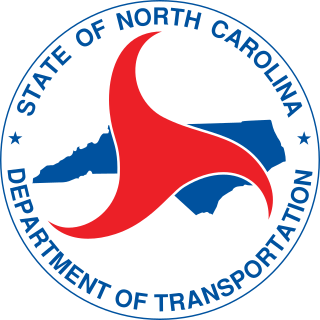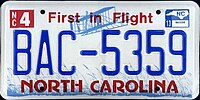
George Wayne Goodwin is an American politician. He was elected North Carolina Commissioner of Insurance in the 2008 election and re-elected in 2012. He was narrowly defeated in his bid for a third term in 2016. However, he quickly rebounded and was elected on February 11, 2017, as chairman of the North Carolina Democratic Party on the first ballot with 92% of the vote among four candidates.

A department of motor vehicles (DMV) is a government agency that administers motor vehicle registration and driver licensing. In countries with federal states such as in North America, these agencies are generally administered by subnational entities governments, while in unitary states such as many of those in Europe, DMVs are organized nationally by the central government.

Interstate 540 (I-540) and North Carolina Highway 540 (NC 540) are part of a partially completed beltway around the city of Raleigh in the US state of North Carolina, forming the Raleigh Outer Loop. When complete, the route will completely encircle the city, meeting its parent route of I-40 in two locations.

In the United States, vehicle registration plates, known as license plates, are issued by a department of motor vehicles, an agency of the state or territorial government, or in the case of the District of Columbia, the district government. Some Native American tribes also issue plates. The U.S. federal government issues plates only for its own vehicle fleet and for vehicles owned by foreign diplomats. Until the 1980s, diplomatic plates were issued by the state in which the consulate or embassy was located.

Motor vehicle registration is the registration of a motor vehicle with a government authority, either compulsory or otherwise. The purpose of motor vehicle registration is to establish a link between a vehicle and an owner or user of the vehicle. While almost all motor vehicles are uniquely identified by a vehicle identification number, only registered vehicles display a vehicle registration plate and carry a vehicle registration certificate. Motor vehicle registration is different from motor vehicle licensing and roadworthiness certification.

The Delaware Department of Transportation (DelDOT) is an agency of the U.S. state of Delaware. The Secretary of Transportation is Nicole Majeski. The agency was established in 1917 and has its headquarters in Dover.
The North Carolina Department of Transportation Ferry Division is a branch of NCDOT that is responsible for the operation of over two dozen ferry services that transport passengers and vehicles to several islands along the Outer Banks of North Carolina.

The North Carolina Department of Transportation (NCDOT) is responsible for building, repairing, and operating highways, bridges, and other modes of transportation, including ferries in the U.S. state of North Carolina.
The North Carolina Turnpike Authority was created in 2002 to speed the implementation of needed transportation improvements by funding some projects with tolls. Governed by a nine-member authority board, it is located within the Department of Transportation and under the direct supervision of the Secretary of Transportation. The authority has the power to study, plan, develop and undertake preliminary design work on up to eleven turnpike projects. At the conclusion of these actives, the authority is authorized to design, establish, purchase, construct, operate and maintain toll highways and bridges. The authority is also authorized to designate one or more lanes of any highway, or portion thereof, into a high-occupancy toll lanes or other type of managed lanes; provided that such designation does not reduce the number of existing non-toll general purpose lanes.

In the United States, driver's licenses are issued by each individual state, territory, and the District of Columbia rather than by the federal government due to federalism. Drivers are normally required to obtain a license from their state of residence. All states of the United States and provinces and territories of Canada recognize each other's licenses for non-resident age requirements. There are also licenses for motorcycle use. Generally, a minimum age of 15 is required to apply for a non-commercial driver license, and 25 for commercial licenses which drivers must have to operate vehicles that are too heavy for a non-commercial licensed driver or vehicles with at least 16 passengers or containing hazardous materials that require placards. A state may also suspend an individual's driving privilege within its borders for traffic violations. Many states share a common system of license classes, with some exceptions, e.g. commercial license classes are standardized by federal regulation at 49 CFR 383. Many driving permits and ID cards display small digits next to each data field. This is required by the American Association of Motor Vehicle Administrators' design standard and has been adopted by many US states. According to the United States Department of Transportation, as of 2018, there are approximately 227 million licensed drivers in the United States, making driver's licenses the primary method of identification in the United States.
The New York State Department of Motor Vehicles is the department of the New York state government responsible for vehicle registration, vehicle inspections, driver's licenses, learner's permits, photo ID cards, and adjudicating traffic violations. Its regulations are compiled in title 15 of the New York Codes, Rules and Regulations.

The U.S. state of North Carolina first required its residents to register their motor vehicles in 1907. Registrants provided their own license plates for display until 1913, when the state began to issue plates.

The Virginia Department of Motor Vehicles is the governmental agency responsible for vehicle titling and registration, driver licensing and maintenance of driver and vehicle records. The agency also collects Virginia's fuel tax, monitors the state's trucking industry and serves as Virginia's Highway Safety Office. In addition, the agency effectively enforces motoring and transportation-related tax laws, and efficiently collects and distributes transportation-related revenues.

In the United States, vehicle safety inspection and emissions inspection are governed by each state individually. Fifteen states have a periodic safety inspection program, while Maryland requires a safety inspection and Alabama requires a VIN inspection on sale or transfer of vehicles which were previously registered in another state. An additional 16 states require periodic emissions inspections.

North Carolina Highway 126 (NC 126) is a primary state highway in the U.S. state of North Carolina. It runs from US 70, in Nebo, to NC 181, in Morganton.
North Carolina Safety and Emission Vehicle Inspection is responsible for ensuring that vehicles in North Carolina meet the safety and in some counties emissions standards. A fee is charged for the inspection of vehicles, and an extra fee if your vehicle has after-market window tinting.

North Carolina Highway 281 (NC 281) is a primary state highway in the U.S. state of North Carolina. The highway runs north–south, connecting communities in western Jackson County and scenic areas of southwest Transylvania County. It is the only North Carolina state highway that changes numbers when crossing into South Carolina.

The Nevada Department of Motor Vehicles (DMV) is a Nevada state agency responsible for issuing driver licenses and vehicle registration. The DMV operates a total of 20 offices across the state, with five in Las Vegas, two in Reno, and one each in Henderson, Sparks, Carson City, Elko, Ely, Fallon, Hawthorne, Laughlin, Mesquite, Pahrump, Tonopah, Winnemucca, and Yerington. The DMV is headed by a director, and the position is currently occupied by Julie Butler. It is based in Carson City, Nevada's capital.
The North Carolina Department of Revenue was created in 1921 by the North Carolina General Assembly. The department is headed by a Secretary that is appointed by the Governor. The secretary is a member of the North Carolina Cabinet. Currently, the department is responsible for administering the collection of the North Carolina state income tax, gasoline tax, sales tax, beverage tax, and inheritance tax.














